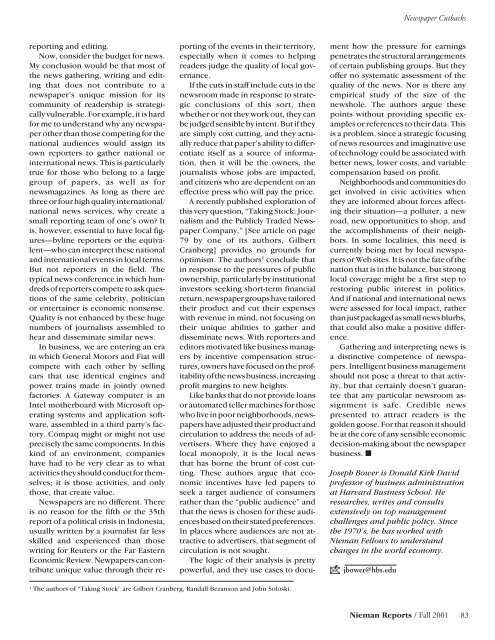Download - Nieman Foundation - Harvard University
Download - Nieman Foundation - Harvard University
Download - Nieman Foundation - Harvard University
Create successful ePaper yourself
Turn your PDF publications into a flip-book with our unique Google optimized e-Paper software.
Newspaper Cutbacksreporting and editing.Now, consider the budget for news.My conclusion would be that most ofthe news gathering, writing and editingthat does not contribute to anewspaper’s unique mission for itscommunity of readership is strategicallyvulnerable. For example, it is hardfor me to understand why any newspaperother than those competing for thenational audiences would assign itsown reporters to gather national orinternational news. This is particularlytrue for those who belong to a largegroup of papers, as well as fornewsmagazines. As long as there arethree or four high quality international/national news services, why create asmall reporting team of one’s own? Itis, however, essential to have local figures—bylinereporters or the equivalent—whocan interpret these nationaland international events in local terms.But not reporters in the field. Thetypical news conference in which hundredsof reporters compete to ask questionsof the same celebrity, politicianor entertainer is economic nonsense.Quality is not enhanced by these hugenumbers of journalists assembled tohear and disseminate similar news.In business, we are entering an erain which General Motors and Fiat willcompete with each other by sellingcars that use identical engines andpower trains made in jointly ownedfactories. A Gateway computer is anIntel motherboard with Microsoft operatingsystems and application software,assembled in a third party’s factory.Compaq might or might not useprecisely the same components. In thiskind of an environment, companieshave had to be very clear as to whatactivities they should conduct for themselves;it is those activities, and onlythose, that create value.Newspapers are no different. Thereis no reason for the fifth or the 35threport of a political crisis in Indonesia,usually written by a journalist far lessskilled and experienced than thosewriting for Reuters or the Far EasternEconomic Review. Newpapers can contributeunique value through their reportingof the events in their territory,especially when it comes to helpingreaders judge the quality of local governance.If the cuts in staff include cuts in thenewsroom made in response to strategicconclusions of this sort, thenwhether or not they work out, they canbe judged sensible by intent. But if theyare simply cost cutting, and they actuallyreduce that paper’s ability to differentiateitself as a source of information,then it will be the owners, thejournalists whose jobs are impacted,and citizens who are dependent on aneffective press who will pay the price.A recently published exploration ofthis very question, “Taking Stock: Journalismand the Publicly Traded NewspaperCompany,” [See article on page79 by one of its authors, GilbertCranberg] provides no grounds foroptimism. The authors 1 conclude thatin response to the pressures of publicownership, particularly by institutionalinvestors seeking short-term financialreturn, newspaper groups have tailoredtheir product and cut their expenseswith revenue in mind, not focusing ontheir unique abilities to gather anddisseminate news. With reporters andeditors motivated like business managersby incentive compensation structures,owners have focused on the profitabilityof the news business, increasingprofit margins to new heights.Like banks that do not provide loansor automated teller machines for thosewho live in poor neighborhoods, newspapershave adjusted their product andcirculation to address the needs of advertisers.Where they have enjoyed alocal monopoly, it is the local newsthat has borne the brunt of cost cutting.These authors argue that economicincentives have led papers toseek a target audience of consumersrather than the “public audience” andthat the news is chosen for these audiencesbased on their stated preferences.In places where audiences are not attractiveto advertisers, that segment ofcirculation is not sought.The logic of their analysis is prettypowerful, and they use cases to documenthow the pressure for earningspenetrates the structural arrangementsof certain publishing groups. But theyoffer no systematic assessment of thequality of the news. Nor is there anyempirical study of the size of thenewshole. The authors argue thesepoints without providing specific examplesor references to their data. Thisis a problem, since a strategic focusingof news resources and imaginative useof technology could be associated withbetter news, lower costs, and variablecompensation based on profit.Neighborhoods and communities doget involved in civic activities whenthey are informed about forces affectingtheir situation—a polluter, a newroad, new opportunities to shop, andthe accomplishments of their neighbors.In some localities, this need iscurrently being met by local newspapersor Web sites. It is not the fate of thenation that is in the balance, but stronglocal coverage might be a first step torestoring public interest in politics.And if national and international newswere assessed for local impact, ratherthan just packaged as small news blurbs,that could also make a positive difference.Gathering and interpreting news isa distinctive competence of newspapers.Intelligent business managementshould not pose a threat to that activity,but that certainly doesn’t guaranteethat any particular newsroom assignmentis safe. Credible newspresented to attract readers is thegolden goose. For that reason it shouldbe at the core of any sensible economicdecision-making about the newspaperbusiness. ■Joseph Bower is Donald Kirk Davidprofessor of business administrationat <strong>Harvard</strong> Business School. Heresearches, writes and consultsextensively on top managementchallenges and public policy. Sincethe 1970’s, he has worked with<strong>Nieman</strong> Fellows to understandchanges in the world economy.jbower@hbs.edu1The authors of “Taking Stock” are Gilbert Cranberg, Randall Bezanson and John Soloski.<strong>Nieman</strong> Reports / Fall 2001 83
















